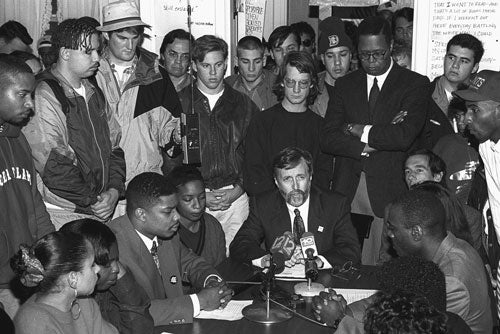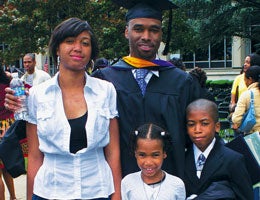The Takeover of Taft Hall

In 1992, more than 200 students led by a newly-formed Black Student Leadership Group unhappy with a truncated Malcolm X quote carved into the façade of the URI Library took over Taft Hall. The students claimed the ellipses in the quote: “A good library…I could spend my life reading,” purposely left out: “If I weren’t out here every day fighting the white man.”
“We felt the quote was a blatant sign of disrespect,” recalls former BSLG member Malcolm Anderson ’94. “We coordinated a retreat to get away and vent. Our job as a core group included research, maximizing the strengths of group members, and crafting a 14-point plan directed toward the administration. We returned to campus focused and unified.
“Dr. John McCray, behind Carothers at right (then URI’s vice president for student affairs) came to Taft Hall the night before the protest. When President Carothers met with us the next day, his sincerity shocked me. When you strategize for a movement or a protest, you try to create an “us against them” mentality. It was hard to be angry because of the level of support the two men provided us from day one. They inherited a legacy that wasn’t supportive, so it took leadership to craft a plan that brought us closer and that responded to our concerns.

On the day of the protest we presented Dr. Carothers with our list of demands, which discussed our concerns as students of color as well as the historical significance of our demands. Many people who listened to the protest on the radio mentioned they not only respected what we said but appreciated how we said it. Unfortunately some students didn’t graduate as a result of the time and dedication it took for the cause. I wish we had a better way to monitor each other.
As I look back, it was like a doctoral thesis where you were being challenged within your organization as well as from the outside. Age has given me a better appreciation for what goes on in the trenches. Theory and historical perspective are fine, but it takes guts to come forward on behalf of others. You must learn the art of negotiating and clearly explaining what you need. You also have to realize who is committed to the cause and who is in it for what they can gain from it.
The beauty of what we did was that we questioned what we knew was wrong, but we did it in an organized and respectful way. I truly believe that is what made the BSLG so special. We reached out and pulled everyone along with us.”
 Home
Home Browse
Browse Close
Close Events
Events Maps
Maps Email
Email Brightspace
Brightspace eCampus
eCampus


